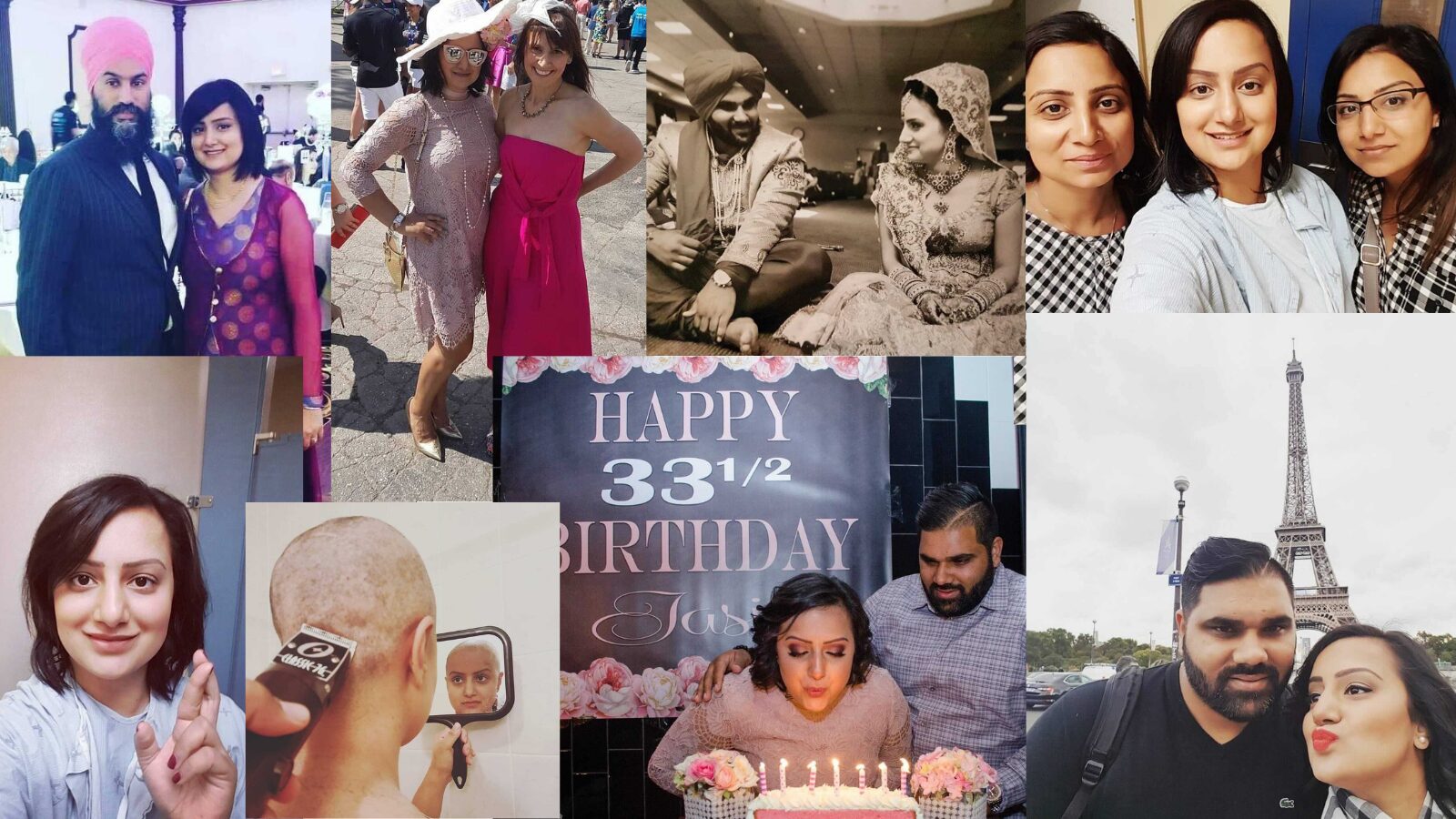20 Years of Rethink: Jaspreet’s Impact
9 MINS to read

Jaspreet Dhindsa-Sidhu was diagnosed with inflammatory breast cancer in April 2015. Her GP thought the rash that brought her in was likely mastitis, but ordered an ultrasound to rule out anything more serious. Unfortunately, it was more serious. And, despite her GP taking this quick investigative action, there was already lymph node involvement. So, at 31, Jaspreet found herself facing aggressive breast cancer and joined Rethink’s private Facebook group to find support and peers. She also started a blog www.cancerin30s.com to document her experience and help raise awareness about breast cancer in someone her age. She wrote pieces and posts for Rethink too. By December 2016, Jaspreet got the news that her cancer was back. It was metastatic and in her brain.
I met beautiful Jaspreet not too long after her metastatic diagnosis at a workshop we held in March 2017. Due to the aggressiveness of her disease, we had just over a year of friendship, but her influence on me and on Rethink was felt deeply and I still think of her a lot.
Jaspreet becoming metastatic so quickly wasn’t something we had never experienced before. As soon as Rethink started working closely with young people with breast cancer, we started working with young people with metastatic breast cancer. Sadly, that meant we started experiencing loss and having to learn how to process grief and support the community. In the early phase of building support programs and education resources, someone passing from MBC would rock the members of one of our local support groups and also our small team of course. The loss would be felt in the broader community too, but as we were able to connect more and more young people with breast cancer together in digital spaces like our private Facebook network, the loss became more visible. More pronounced. It’s not that incidence was skyrocketing, but sometimes it felt that way. Loss would come in waves.
At the same time, we started to notice other groups and organizations responding to our small “a” advocacy that young people got breast cancer too. Rethink had put young people on the breast cancer agenda, and in doing so, we inspired other organizations to address their gaps in care. We were thrilled to see others create support programming and resources specifically for those diagnosed at a younger age. We were often approached to fund or advise on these initiatives. And we did. But seeing others take on support and care for younger people gave us more space to address another glaring gap: MBC. We could see so clearly that stage 4 needs more.
We responded by giving the stage to those with MBC, hosting an event called Young + Metastatic in April 2015. That would have been right around the time Jaspreet was initially diagnosed. We screened our documentary, I AM ANNA, featuring artist and architect Anna Craig, and followed the screening with a panel discussion with four young women with MBC: Anna, Teva Harrison, Jasmin Fiore Dodge and Melanie Warner. Much like 2020’s “Pass the Mic” concept, we gave a platform for the MBC community to be seen, heard and understood. The evening served as an initial needs assessment and from it came important tools, co-created with those who had taken the stage that evening and launched by that October.
What we heard loud and clear was that those with MBC needed more time. They needed one more tool in their treatment toolbox. They needed to know that when their current treatment stopped working there would be another one to give them as much quality and quantity of life as possible. We knew that breakthrough treatments were on the horizon and that CDK 4/6 inhibitors were coming to Canada. We also knew that Canada was starting to lag further behind other countries in terms of access to these innovative targeted and costly cancer treatments. The term “prioritization” was being tossed around by some bureaucratic decisionmakers and we worried breast cancer was being positioned as “one of the good cancers” that already had a lot of treatments. For Rethink, having felt the impact of MBC in the community, this just wasn’t ok.
Rethink had already developed an effective policy change model and had been the driving force behind several important policy change “wins” that improved access to treatment and care for those with early breast cancer. Urgently, people with MBC needed a win. And so, very organically, a shift happened at Rethink. We needed to raise our collective voices to say breast cancer still needs more. And we needed to bring the affordability conversation back to “value for patients.” With our digital focus, a growing influence on social media and a strategic approach to advocacy, change was possible. We just needed to do a bunch of fact finding to understand the issue and talk to all stakeholders involved—oncologists, drug manufacturers, government bodies. But first we had to talk with those with MBC and explore the importance of the voices and values of those living with MBC in Canada.
That workshop was Jaspreet’s first official foray into advocacy. She drove in from outside of Toronto and had to join the meeting a little late. Introductions had begun and we were going around the room discussing all the issues around delays in accessing innovative cancer medicines in Canada. Some of the women at the meeting were highly experienced “metsters”—Judit, Heather, Patricia, Cathy—and knew a lot about how the drug approval system worked. Jaspreet went last and with a smile and half laugh said something like, “This is all pretty new to me. You ladies sound like you know a lot about advocacy, so just sign me up and tell me what I need to do. I want to help.”
Jaspreet certainly did help. Almost overnight, she transformed from determined rookie to powerhouse advocate. She took on media interviews and speaking engagements to help the public understand metastatic breast cancer and help others with MBC feel less alone. She even made her goal of speaking in person with Jagmeet Singh (who was campaigning as leader of the NDP at the time) about MBC a reality. She’d also generously agreed to lend her face to our #MBCintheDark advocacy campaign calling for increased transparency and accountable deadlines for cancer drug negotiations.
I don’t think any of us could have anticipated just how much her face would be shared and re-shared all over social media, but it worked. Her face and story helped motivate almost 10,000 Canadians to take action, sign our petition, send thousands of follow up emails to the government and even book meetings with their local representatives. Jaspreet’s heavy burden of advancing disease kept her from being at our Queen’s Park Advocacy Day in person that October, which was the culmination of the campaign. She would have been our speaker and a powerful voice with 40 other metastatic advocates as we filled the viewing gallery and later worked a room full of politicians, presenting our petition. But that’s the reality of late-stage MBC. It takes your mobility. It takes so much.
I’m forever grateful that Jaspreet lent her face and story to our first official MBC policy change campaign. Jaspreet was huge part of our success in gaining more transparency and accountable deadlines for new innovative cancer drugs to be accessible in Canada. I’m also grateful for her just being her. Jaspreet exuded kindness and warmth. She was one of those people who literally shone. Whenever we met, she would put on a brave face and give me a big warm smile and a huge hug. My daughter was completely taken with her. I know she had this effect on so many people.
Jaspreet also managed the tricky balance of explaining the challenges and urgency of the situation, and also showing that many with MBC are “living” with their disease. She conserved energy for bucket list activities and goals—from dream trips, to daring activities like the CN Tower EdgeWalk, to learning to swim, to throwing a 33 1/2 birthday. She inspired so many. But you only had to follow her blog to see that she had her darker side too. None of us are all one thing and Jaspreet shared her deepest, darkest thoughts in some of her posts, which were so cathartic for her. She shared the raw and realness of treatment and side-effects. And she felt very strongly that as an Indian woman, she needed to speak out to raise awareness in her community and not let taboos about cancer cause someone their life.
Jaspreet, I miss you and I think of you often. I know your legacy has many components and a big part of it is the lasting love you left with your nearest and dearest. Your legacy is also being part of making change to improve the lives of those with MBC and inspiring Rethink to do more for stage 4. There’s still much more to do, but thank you. Forever Forward.
MJ DeCoteau, Founder + Executive Director of Rethink Breast Cancer. At 22, after losing her mother to metastatic breast cancer, MJ was hard-pressed to find relevant information that was not scary and overwhelming about her own risk factors. She quickly realized that young people were in the dark about breast cancer simply because they weren’t being targeted by awareness campaigns and other efforts.
By 2001, she brought together a group of innovative, energetic, and creative minds to found Rethink Breast Cancer, putting young people concerned about and affected by the disease in the spotlight for the very first time. Today, MJ leads Rethink’s small but dynamic team of staff and volunteers dedicated to creating resources, campaigns, events, research, and advocacy initiatives that help young people live better and live longer.
